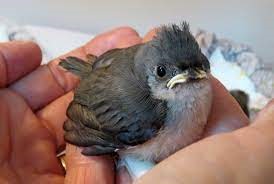It's Baby Bird Season written by Park Manager Sally Lieb
Picture not original, taken from internet! This picture is a fledgling tufted titmouse. We are in the season when birds are leaving their nests, a stage in a bird’s life known as a fledgling. Like the 18 year old who graduates from high school and moves out of mom and dad’s house, bird fledglings are often much bolder than they should be. They have feathers, but they don’t have skills yet in flying. That makes them very vulnerable to danger and death, especially if they are unable to stay close to their parents. On the morning of April 20, I heard a report that there was an injured cardinal at the canoe launch who had plastic wrapped around its wings. The story was, it could not fly due to its injuries. I went to the canoe launch to investigate. At the launch, staff there had placed the bird in a cardboard box. Having seen many, it only took a glance for me to determine that this was a fledgling bird. There was a large plastic barrel, the kind typically used for garbage, that was being used to store pieces and parts to repair kayaks and canoes. This young bird had fallen into the barrel and was unable to get out on its own, encumbered by all the kayak pieces as well as not enough skill to fly out. It was very lucky for the little bird that the alert staff found him/her before (s)he died from starvation from being unable to get out. Having about 17 years experience in the zoo field, which also included rehabilitation of injured wildlife, I felt confident to make an assessment and examined the little tyke. I delicately spread each wing, and felt the bones and joints. Everything was intact, and the muscles pulled the wings back into place firmly when I let go of the outstretched wing. (S)he didn’t much care for my handling, and started to chirp. There was an immediate answer over my right shoulder. I walked in the direction and saw the rest of the titmouse family flying about and chirping back and forth, communicating with my captured fledgling. After a brief rest on my finger (I could feel (s)he had a perfect strong grip with both feet), the fledgling flew off my hand straight and strong, 3 feet off the ground for about 20 feet directly to the rest of the family. So a few pointers for everyone on this situation:
“The Migratory Bird Treaty Act prohibits the take (including killing, capturing, selling, trading, and transport) of protected migratory bird species without prior authorization by the Department of Interior U.S. Fish and Wildlife Service. “ https://www.fws.gov/birds/policies-and-regulations/laws-legislations/migratory-bird-treaty-act.php |


